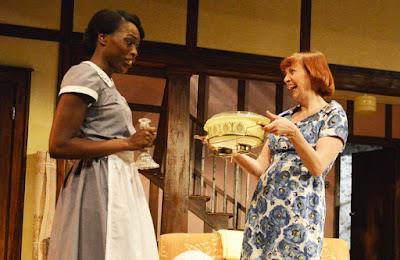BULL/PARTY
Theatre at Baddow in the Parish Hall
27.04.2016
Two new plays, both
excellent of their kind, given polished productions by Theatre at
Baddow this week.
Mike Bartlett's Bull is a
relentless hour of bullying and paranoia. Office politics in a
corridor with a water-cooler. Pinterish in its unpleasantness, it's
an uneasy listen. You long for a twist, a turning point. Worm,
tables, whatever. Never comes. Roger Saddington's Thomas just sits
and weeps under the final acid onslaught from Ruth Westbrook's icy
Isobel.
There's much talk of truth
and falsehood. The harassment, the torment, the naked nastiness
recall the worst excesses of the playground – several times
referenced in the script - “we're not at school”.
It's Thomas's worst
nightmare – losing his job, access to his son Harry – and maybe
this is the key to the piece. We all want to hit Isobel – Thomas
tries repeatedly, but, as in a dream, his fist never connects. He
knocks himself out in the end. Isobel finds no sympathy, leaves the
teetotal loser his single malt leaving gift. “When you wake up, a
drink may be just what you need ...”
Four superb performances
in Jim Crozier's confident production – the pauses, the looks, all
spot on.
Saddington is a
sympathetic underdog, maybe too much so – should we perhaps suspect
that he “brings it on himself” ? Terry Cramphorn is a smug,
unfeeling CEO. And Patrick Willis is outstanding as Team Leader Tony,
a master of merciless banter, glued to his smartphone, casually
sticking the knife in, rocking in his chair.
Bull. Bullshit, Bullying,
and the Bullfight, with its carefully choreographed, pitiless
picadors.
Followed here not by
Bartlett's Cock, for which it was originally the companion piece, but
by a much jollier affair - Tom Basden's Party.
More childish banter here,
but much more amusing, while still keeping a satirical eye on matters
social and political. Lots of argy-bargy over language. Joanna Lowe
directs a well-cast company: five clueless twenty-somethings meet in
Jared's mum's shed to thrash out policies for their new
anti-capitalist party. Jared – a lovely, earnest performance from
Kieran Low – takes charge, Naneen Lane's dim Phoebe takes the
minutes. Nathan, in sandals and cycle-clips, the only one in
employment, is played with precisely the right keen bewilderment by
Nathan Lowe, and Vicky Wright is excellent as the sulky Mel. Roger
Saddington – the only actor allowed to do both shows – is Jones,
roused to fury by lack of coffee. David Saddington pops in briefly as
the mysterious Short Coat.
It's like a long comedy
sketch, really, but consistently funny, even if these characters are
no more believable as adults than the awful suits in Bull.
















